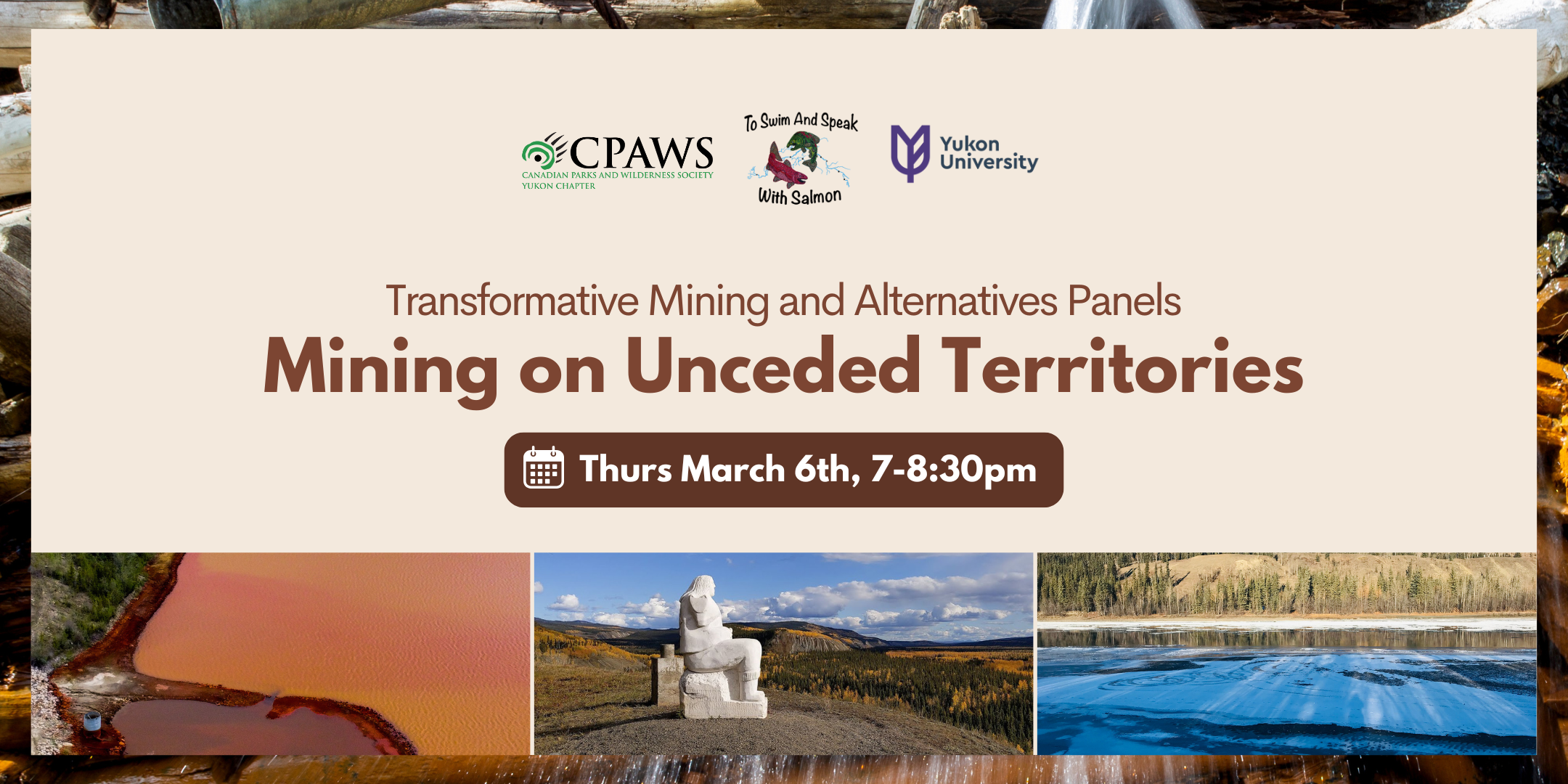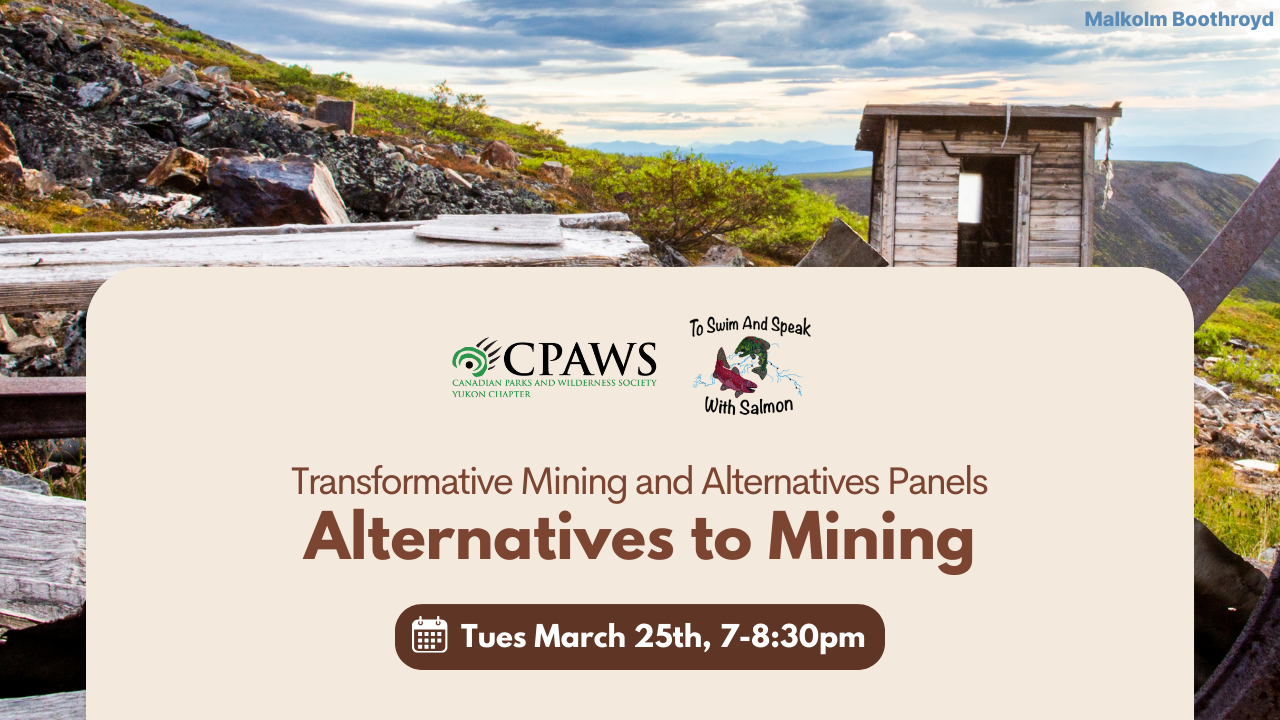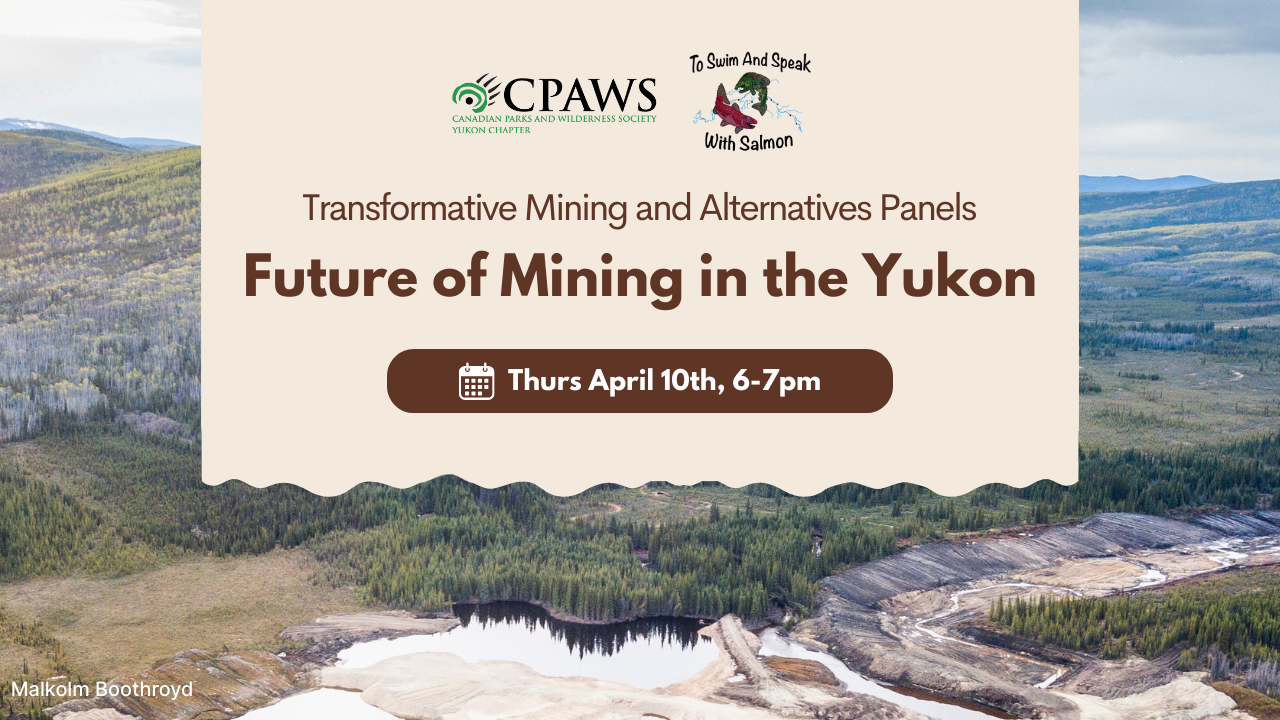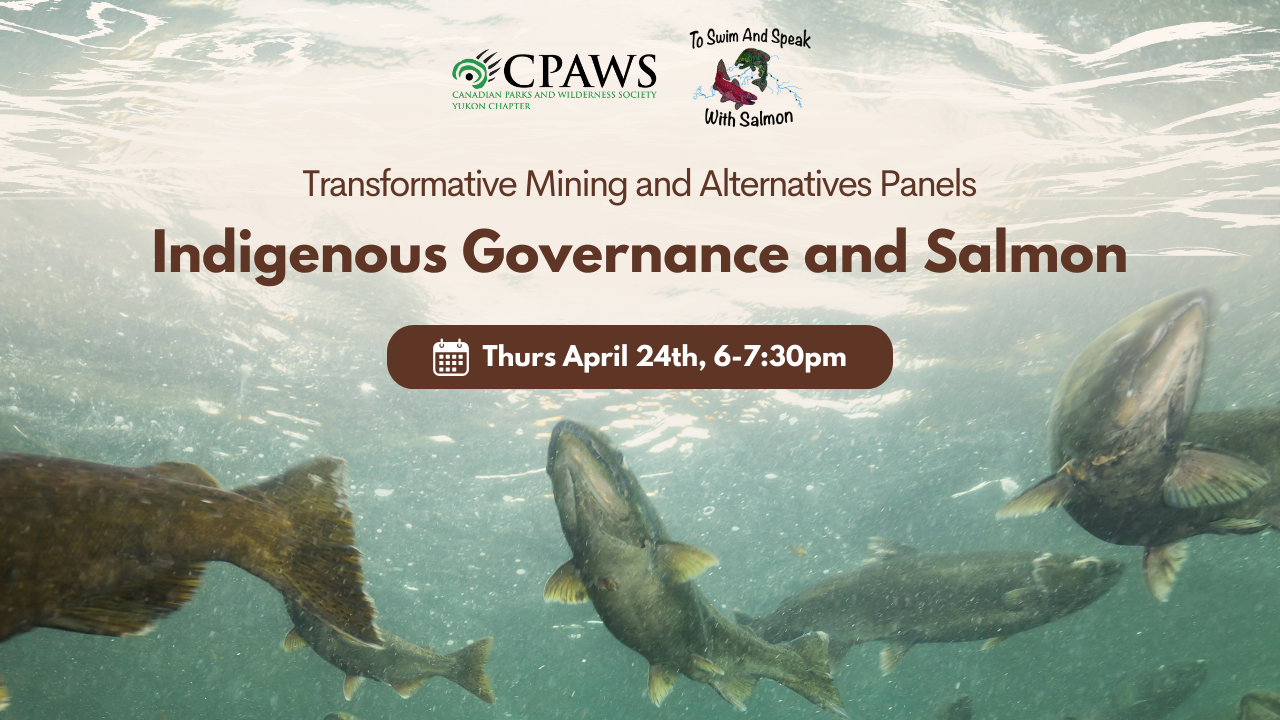Alternatives to Mining
Transformative Mining and Alternatives Panel
There’s a lot of focus on the economic need for mining in the Yukon, with little attention paid to alternative economies and investment opportunities. Hear more about alternatives to extraction in the Yukon.
This panel was held on March 25th, 2025 as part of a series of four public, virtual panels with thinkers and leaders from across the Yukon and beyond to ask: How can we transform mining to ensure disasters such as the Eagle Mine failure never happen again? What are the alternatives to resource economies?
Panelists included Helaina Moses (First Nation of Na-Cho Nyäk Dun), Steve Ellis (MakeWay), Teri-Lee Issac (Tutchone Tours), Jani Djokic (Na-Cho Nyäk Dun Development Corporation). Moderated by Jared Gonet (To Swim and Speak with Salmon).
“If more money was invested in renewable energy, this could be promoting ecotourism and supporting sustainable industries in the Yukon. It could really reduce its reliance on the mining resources economy”
— Teri-Lee Issac, Tutchone Tours
“I get to look at everything as an economic ecosystem, as a whole — taking a lot of those principles of circular economies and from a community resilience standpoint [to ask], how does each opportunity feed into each other? I think that is a path forward for a lot more sustainability if we are going to reduce our dependence on the mineral resource economy, knowing that there’s still a lot of volatility in some of the other alternative economic models and opportunities.”
— Jani Djokic, Na-Cho Nyäk Dun Development Corporation
“We see this trend in the Yukon of abandoned mines and companies just leaving their projects… It feels like it’s almost left to our responsibility. It feels like Indigenous governments are the ones pushing Yukon government for help, pushing Yukon government for more things to do the reclamation work. I see economic opportunities [there], maybe tree planting or even starting a native seed bank in the Yukon because mining companies do reclamation with out of province sourced seeds… As you look at project timelines, you don’t do reclamation until after the mine is closed, which I think is wrong, and a little backwards. We could be doing things a lot better when we talk about sustainable mining.”
— Helaina Moses, First Nation of Na-Cho Nyäk Dun Citizen
“My friend mused that actually northern Indigenous communities do a whole bunch of stuff really well, don’t need to build their capacity because they already do this stuff inherently well, extremely strong. Let’s build an economic model that suits what Indigenous Northern communities want to do, what they aspire to do and what they’re already really damn good at. It totally flips the script around. It’s our responsibility to build an economic model that suits the strengths and the assets that are already in our communities in the North.”
— Steve Ellis, MakeWay
“There’s an [extractive] economic model that’s ‘inherently’ good and ‘inherently’ right and northern Indigenous peoples and their communities are [treated] at a deficit to participate effectively. So, all the investment that’s made in the North is about capacity-building, training, and bringing especially Indigenous peoples from remote communities into that workforce. It’s certainly generated some wealth for some individuals and families, but it’s created also environmental problems, social problems, and so on.”
— Steve Ellis, MakeWay
“It’s very important to teach our youth the traditional lifestyle, and if they’re not Indigenous, just having them there. We live in the North, they gotta learn some survival skills on the land in case they have to turn back to the land if anything were to happen in this crazy world that we live in”
— Teri-Lee Issac, Tutchone Tours
“Bringing people together to do the reclamation, the work to heal the land is so important. It brings more healing in communities, because you bring back that reconnection to planting a tree or picking seeds. I feel like there’s a lot of interconnected things that could [arise] if we started a seeding project in the Yukon. We could also focus on medicines or berries. We would be improving food sovereignty for communities. It doesn’t just necessarily need to be trees and grass, we can Indigenize it and make it fun and build relationships with communities”
— Helaina Moses, First Nation of Na-Cho Nyäk Dun Citizen
“When we talk about ecotourism, that is an economy in itself. When we talk about restoration, that is an economy in itself. In our current overarching financial systems, at least here in Canada, those aren’t valued as economies. Those aren’t valued as assets. It has been very difficult for me in my role, working in a corporate structure where you have to go to the banks for financing, and you’re constantly having to fight against: But where’s the building? How much is the building worth? How much is the equipment worth? And that’s not what we’re talking about…there are so many other indicators that we need to start developing. We’re only going to do that through partnership and at the local level, to figure out what is it on a very local level that matters and have that feed up into the financial systems that exist.”
— Jani Djokic, Na-Cho Nyäk Dun Development Corporation
“There’s programs and services in tourism that you could really look up [as an] entrepreneur. That’s what really triggered me to start my business, although I had that idea in the back of my mind for 10 years. After taking a 10 month training in tourism, I was like, ‘Yeah, I’m going to do this…’ Yukon First Nations also just came out with a land-based grant to do on the land-based camp. So I was able to tap into that… I just feel like there’s a lot of support for especially Indigenous tourism”
— Teri-Lee Issac, Tutchone Tours
Supported by CPAWS Yukon, To Swim and Speak with Salmon, and Research from the Front Lines. Organized by Jared Gonet (Director, To Swim and Speak with Salmon, Faculty in Indigenous Governance and Science at Yukon University and PhD candidate at University of Alberta), Caitlynn Beckett (PhD Candidate at Memorial University), and Krystal Isbister (PhD candidate at University of Alberta and Yukon University); all of whom do research on mining or land relations in the Yukon.
Quotes edited for length and clarity.




